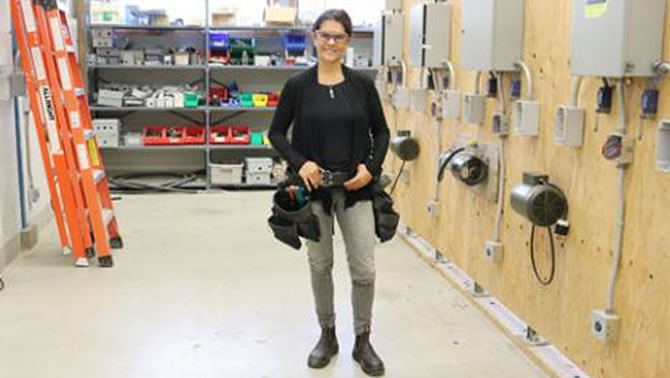Women encouraged to explore the trades at Selkirk College
The 14-week program provides women the opportunity to check out different elements of the trades and get hands-on experience.

Selkirk College Electrical Foundation Program Instructor Julie-Claire Hamilton will be leading the Trades Discovery Program for Women which begins on October 26, 2015. — Photo courtesy selkirk.ca
Julie-Claire Hamilton fully understands the challenges faced when delving into what has traditionally been known as a man’s world.
Though she has been plying her trade for more than a decade, it hasn’t always been easy on the jobsite frontlines for the journeyperson electrician.
“As a woman in trades, I still encounter the old-school attitude where some men wonder what you are doing on the job,” says Hamilton. “You have to prove yourself even that much more, but the mentality is changing and that needs to happen with everyone. We are just as capable in the trades and in some cases women can excel at them.”
Now an Electrical Instructor at Selkirk College, Hamilton has been charged with leading a special cohort through an exploration of trades this fall. In partnership with the Greater Trail Community Skills Centre, Selkirk College is offering a special Trades Discovery Program for Women. The 14-week program with a two-week job shadow component provides women the opportunity to check out many different elements of the trades, get hands-on experience, and gain exposure to a variety of worksites and employers.
“The need for qualified tradespeople will continue to be a constant in our economy,” says Kate Pelletier, Dean of the Selkirk College School of Industry & Trades Training. “With such a demand for skilled workers, it doesn’t make sense that women—who make up half the population—are barely represented. They need to be encouraged to take a look at the trades as a potential career choice. The goal of this program is to introduce women to the trades who show interest, but perhaps lack the confidence to dive right in.”
The Get It Done Attitude
Hamilton grew up in Deep Cove near Vancouver and describes her family as the un-handiest people she knows.
“I don’t even think we had a screwdriver in the house growing up,” she laughs.
After high school, Hamilton pointed herself in the direction of a Bachelor of Arts degree and attended the University of Victoria. Finding it wasn’t for her, she switched gears and went to chef school. Fifteen years ago she moved to Nelson and while working in area ski lodges started to take a look at new directions. A friend who was working as a first year electrical apprentice pushed her towards the trades because of the long-term prospects and she enrolled in Selkirk College’s Electrical Foundation Program.
“I really didn’t know what an electrician did and had never had any experience with power tools,” she says. “So I came into the program as the only woman in the class with zero experience… it was very intimidating.”
What she lacked in background knowledge, Hamilton made up with in determination. Still, the first few months were difficult.
“A lot of it was in my head because nobody wants to be the worst in the class,” says Hamilton. “Everything was new to me… going back to school, the power tools, the work required to be successful.”
Hamilton credits former Electrical Program instructor Dan Obradovic with providing the environment that fostered success.
“He was amazing and a real mentor,” Hamilton says of the now-retired Obradovic. “Dan was always super encouraging and supportive in the assignments. He didn’t let me off easy at all and I had to do the work just the same as everybody else, but he understood where I was coming from and was a great instructor.”
From Foundations to the Frontlines
Hamilton completed the Electrical Foundation Program with a newfound confidence, solid grades and prospects for a bright future. She then moved her way through four years of apprenticeship, working on local jobsites and returning to Selkirk College for the education component of the process which culminated with attaining her interprovincial Red Seal ticket.
Despite the qualifications, top-notch skills and solid work ethic, Hamilton continued to find working in a male-dominated industry tough.
“Whether or not you are good at your trade, you will stand out in a jobsite because you are not the norm,” she says. “So of course it’s a challenge, but it’s rewarding when they realize you can do it and you gain that respect.”
Hamilton has been teaching in part-time and relief capacities in the electrical program for the last eight years. She came full circle last year when she returned to teach the Electrical Foundation Program. This summer Hamilton is finishing up her second cohort of Electrical Foundation Program students.
“I understand what the students are going through because it wasn’t too long ago that I was in the program,” she says. “I really do care about every student in the class. Many of these students are going to be applying to places that I have worked for, they need to come out with my standard. If I’m out on the jobsite they might be working beside me, so I want them to have the right skills.”
A Great Opportunity for Women
The Trades Discovery Program for Women is being offered in collaboration with the Greater Trail Community Skills Centre and runs October 26, 2015 to February 12, 2016 at the college’s Silver King Campus in Nelson. A few years ago, Hamilton worked on a similar initiative called Skilled Trades Exploratory Program (STEP) for Women where she taught the electrical portion of the program. This time she will be leading students through the entire scope with help from the Skills Centre and her peers at Selkirk College in carpentry, welding, metal fabrication and machinist/millwright.
“I’m excited about the possibilities in the trades and the chance to share them with women,” says Hamilton. “There are so many avenues to pursue and once you get that ticket, the opportunities are endless.”
The program will be split between Trail and Nelson with the first three weeks in Trail and the shop portions in Nelson. Students will explore the trades with hands-on activities and exposure to actual worksites. They will learn what academic skills are required if they want to pursue trades training as well as what employers are looking for in future workers. The class will also provide employable skills in fall protection, confined space and forklift operations—skills that are useful on many jobsites. At the conclusion of the program, participants will have a better understanding of their individual strengths and possible pathways for further exploration.
Hamilton says that one of the biggest barriers for women in trades is confidence. As she has learned over the years, experience comes through making mistakes in an environment that encourages learning and growth.
“You have to push through and ask for help,” says Hamilton. “You are not a superhero… there are some things that I can do better and some things that guys can do better. That has nothing to do with male or female, we are all just people and we don’t know everything.”
With two young children of her own, Hamilton says when her two-year-old daughter is ready to explore career choices she hopes that the trades will be considered no different than other post-secondary options open to young people.
“I hope it won’t be such a big thing that we don’t even have to really talk about it,” says Hamilton. “I hope if she wants to be a welder or a mechanic, she will just be another welder or mechanic doing the job. I hope that’s what it will be like in 20 years, but it has to start at a lower level. It has to be brought to women at a younger age. As more women get into the trades, it will just be a common thing to see. It will just be the norm one day.”
The tuition for the Trades Discovery Program for Women is $800 and funding may be available for those who are eligible by contacting Jaime Malcolm at the Greater Trail Skills Centre at 250-368-6360. To find out more about the program call 250-354-3204.





Comments